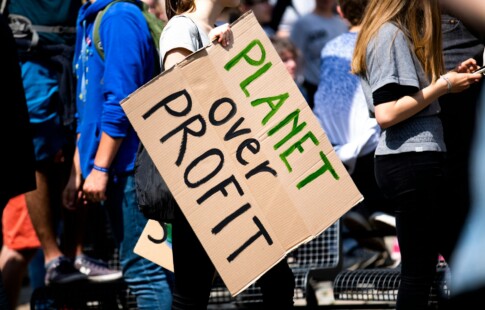
7 Companies Making Waves with Sustainable Investing
We are reader-supported. When you buy through links on our site, we may earn affiliate commission.
Sustainable investing is a financial strategy that considers environmental, social, and governance factors when choosing projects and companies to invest in. This helps ensure businesses make a meaningful contribution to society and the environment.
Unfortunately, it is possible that companies “greenwash” their products to appear more environmentally friendly and sustainable to the public or to attract investment from companies looking to invest in a sustainable supply chain.
But what does greenwashing mean in sustainable investing, and how have these top companies proven they are the real deal? Let’s examine the creative ways these businesses have prioritized the planet’s and its people’s welfare in their investment strategies.
Top Companies with Sustainable Investing Strategies
1. SIMS LTD.
SIMS Ltd. is a leader in the metal recycling industry and an expert at providing circular technology solutions. This company has managed to incorporate sustainability and environmental friendliness into every aspect of its business.
The Australian company earns 10% of its revenue (before taxes) from investing in supply chains that support the circular economy. A circular economy business model ensures fewer raw materials get used in products by using tactics such as parts harvesting, refurbishing, recycling materials, and reducing waste.
They have invested in technology that helps extract value from waste materials. To align their business practices with the UN Sustainable Development Goals enabled them to impact communities by creating decent work and economic growth and to make a real difference to climate change.
2. Brambles Ltd.
Another Australian company, Brambles Ltd, is a supply chain and logistics company that has achieved carbon neutrality. They invest in reforestation and renewable energy projects. They also source timber sustainably and are known to assist their timber suppliers in achieving Chain of Custody (CoC) certification, which ensures that timber is sourced sustainably and responsibly.
Investment to create innovative products, such as the first closed-loop, upcycled plastic platform made from post-consumer waste, demonstrates their ability to incorporate sustainability into every aspect of their business model.
Their commitment to diversity and inclusion has seen Brambles set the ambitious goal of ensuring that 40 % of its management roles were held by females by 2025. Bramble’s support of initiatives such as the “Communities Positive” project ensures that millions of meals are donated to food rescue partnerships.
3. Bridgestone Corporation
Bridgestone is making a meaningful positive impact on the environment by investing in projects that help diversify the world’s rubber supply. Investing in the Biorubber Process Research Center (BPRC) in Mesa, Arizona, has helped the business decrease reliance on a single source of rubber (such as rubber harvested from Hevea trees).
They have expanded their rubber sources by harvesting rubber from the guayule desert shrub, a native plant in the Southwestern U.S. region. By doing this, they promote a more sustainable rubber industry.
They make a conscious effort to invest in and partner with other companies in their supply chain that promote best practices that align with international principles for human rights, as outlined in the Bridgestone Global Sustainable Procurement Policy.
4. Best Buy
The specialty retailer Best Buy has demonstrated a real commitment to saving the environment. They have invested heavily in their e-waste recycling program, which they started in 2009. To date, they have collected and recycled over 2.7 billion pounds of electronics and appliances.
Best Buy collaborates and invests in product manufacturers who align with its sustainability and environmental goals.
It sources energy-efficient products and services, such as smart home technologies and appliances, to reduce its customers’ energy consumption. In fact, it aims to achieve $5 billion in energy savings for its customers by 2030.
By using sustainable investing principles in every area of its supply chain, Best Buys is making a significant contribution to sustainability. Its governance and accountability policy also encourages its employees to support environmental and sustainability initiatives.
5. Nvidia
Nvidia is a leader in the technology industry, and it is involved in designing and manufacturing graphics processing units, gaming technology, and autonomous driving technology solutions, among many other products. They are heavily invested in research and development projects to improve its products’ energy efficiency.
They have also demonstrated a commitment to diversity and inclusion. Devoted recruiters assist females and minorities through the hiring process, to improve workplace diversity. Competitive wages, promotions, and pay parity are all carefully considered in their hiring decisions.
Of course, a company such as Nvidia knows they consume a significant amount of energy. With this in mind, Nvidia has made a commitment to partnering with renewable energy companies to buy or generate enough renewable energy to match 100 % of its global traditional energy usage.
6. Microsoft
Microsoft has invested in carbon removal technologies for use across its operations and supply chain. This is part of their commitment to being carbon negative (the process of eliminating more carbon from the atmosphere than it creates) by 2030
In addition, they have established a $1 Billion Climate Innovation Fund to develop new climate technologies. This substantial investment helps to accelerate efforts to stabilize the climate crisis.
This tech giant also invests in water management initiatives and technologies to restore the water basins where it operates. Protecting and restoring the environment in which it works shows that it is giving back meaningfully.
7. Autodesk
Autodesk, a leading multinational software company based in America, has made massive strides in advancing social and environmental initiatives. They issued its first sustainability bond in 2021, an investment totaling $1 billion.
The proceeds of this fund are used to further Autodesk’s sustainability impact strategy. The sustainability bond ensures that both Autodesk’s financial goals and commitment to positive environmental and social outcomes are met.
To date, they have successfully invested in energy renewal projects, the development of eco-efficient products and technologies, sustainable water and wastewater management, and green building projects, to name but a few.
Their efforts have seen the company attain net-zero greenhouse gas (GHG) emissions for its core business and supply chain. Furthermore, the company focuses on investment in projects that increase diversity and inclusion. This in turn promotes economic opportunities for those in underrepresented communities.
Conclusion
These 7 companies are making waves with their sustainable investment efforts, to ensure that their business strategy makes positive contributions to society and the environment. The effects of these financial strategies impact not only their employees but also their supply chain, stakeholders, and local communities, positively and sustainably impacting the world for years to come!
Sources
https://www.brambles.com/sustainability
https://www.bsr.org/en/case-studies/best-buy-a-focus-on-delivering-solutions-and-sustainability
https://sustainabilitymag.com/articles/nvidias-esg-and-corporate-social-responsibility-strategy
https://www.microsoft.com/en-us/corporate-responsibility/sustainability
https://ampion.net/about/blog/public-support-for-solar-continues
Share on
Like what you read? Join other Environment.co readers!
Get the latest updates on our planet by subscribing to the Environment.co newsletter!
About the author

Jane Marsh
Starting from an early age, Jane Marsh loved all animals and became a budding environmentalist. Now, Jane works as the Editor-in-Chief of Environment.co where she covers topics related to climate policy, renewable energy, the food industry, and more.





